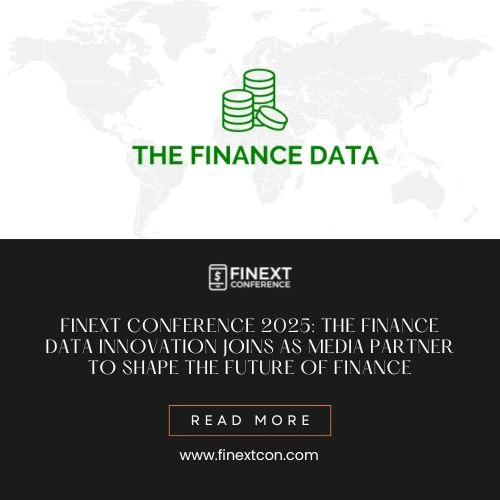The FiNext Conference has always been a platform where innovators, thought leaders, and trailblazers converge to share insights and shape the future of the fintech and entrepreneurial ecosystem. This year, we are thrilled to announce that Zeena Zalamea, the UAE-based broadcaster, producer, and entrepreneur, will be joining us as a distinguished speaker. With a career spanning over a decade and a portfolio of more than 10,000 hours of content across television, radio, and podcasts, Zeena Zalamea is a name synonymous with excellence and innovation in media. Her ability to craft compelling narratives and her passion for fostering the regional startup ecosystem have made her a revered figure in the Middle East. A Media Maverick and Entrepreneur Zeena’s journey in media is as dynamic as the industry she represents. From captivating audiences with her on-air presence to shaping the voices of others behind the scenes, Zeena’s expertise extends beyond broadcasting. Her entrepreneurial spirit led her to establish Soundbite, a media consultancy that pioneers innovative content strategies, and co-found Portal Productions, a podcast production company delivering engaging and impactful audio experiences. Her ventures are not just businesses—they are testaments to her commitment to creativity, storytelling, and empowering the next generation of creators and entrepreneurs. Championing the Regional Startup Ecosystem In addition to her work in media, Zeena is a vocal advocate for the regional startup ecosystem. She has consistently supported budding entrepreneurs, offering them platforms to amplify their stories and ideas. At the FiNext Conference, she will share her unique perspective on how storytelling and media can drive business growth, build brand authenticity, and foster meaningful connections. What to Expect from Zeena’s Session Zeena’s session at FiNext promises to be an enlightening experience. Attendees can look forward to learning: Whether you’re a fintech enthusiast, entrepreneur, or media professional, Zeena’s session will offer invaluable insights that bridge the worlds of media, entrepreneurship, and innovation. Shaping the Future Together As the FiNext Conference continues to bring together the brightest minds in fintech, the inclusion of thought leaders like Zeena Zalamea underscores our commitment to fostering collaboration and innovation across industries. Zeena’s passion for impactful storytelling and dedication to empowering entrepreneurs will undoubtedly leave a lasting impression on attendees. Don’t Miss Out Join us at the FiNext Conference to hear Zeena Zalamea and other industry leaders discuss groundbreaking ideas, share actionable insights, and shape the future of business and innovation. Reserve your spot now and be part of a transformative experience! About FiNext ConferenceThe FiNext Conference is one of the most anticipated events in the fintech world, offering a platform for networking, knowledge-sharing, and collaboration among industry professionals, entrepreneurs, and visionaries.
Author: user
Trailblazing Financial Inclusion: Rakhil Fernando Joins Finext Conference as a Keynote Speaker
The Finext Conference is thrilled to announce Rakhil Fernando, a visionary entrepreneur and a transformative leader in e-commerce and fintech, as one of its keynote speakers. Known for his dynamic leadership and innovative solutions, Rakhil has been instrumental in driving financial inclusion and empowering individuals across Asia. As the CEO of Yabi, a cutting-edge financial platform, Rakhil Fernando is revolutionizing the personal finance landscape with groundbreaking solutions like the AI Personal Financial Coach. His mission is clear: to enhance financial literacy and bridge the gap between education and action, empowering individuals to take charge of their financial futures. A Trailblazer in E-Commerce and Fintech Rakhil’s remarkable career spans diverse roles in the e-commerce and fintech sectors. Before leading Yabi, he served as the Chief Corporate Affairs Officer at Daraz Group, an Alibaba International Digital Commerce company. At Daraz, he played a pivotal role in shaping corporate strategy and stakeholder engagement while driving initiatives that revolutionized South Asia’s digital economy. As Managing Director of Daraz, Rakhil spearheaded projects that had a lasting impact on the region’s e-commerce growth. He also founded KOKO, a Buy Now Pay Later (BNPL) platform under the Alibaba Group, which expanded financial access in Sri Lanka, Pakistan, and Bangladesh. His entrepreneurial ventures include establishing Kashmi, a neo-banking app in Singapore that introduced millennials to innovative financial tools for spending, saving, and investing. From Aerospace to Fintech Innovation Rakhil’s journey is as inspiring as it is unconventional. With a Bachelor of Science in Aerospace Engineering from Embry-Riddle Aeronautical University, he initially pursued a passion for aviation, even training as a pilot. His transition into finance and banking saw him excel in roles at Credit Suisse, Eureka Hedge, and Coutts & Co Bank in Singapore, where he gained extensive experience in wealth management and investment strategies. A Champion for Social Good Beyond his professional achievements, Rakhil is deeply committed to social impact. As a Goodwill Ambassador for Habitat for Humanity, he actively advocates for housing initiatives in underserved communities, contributing to sustainable development worldwide. What to Expect from Rakhil at the Finext Conference At the Finext Conference, Rakhil will share his insights on fostering financial inclusion through innovation, particularly in emerging markets. Attendees can expect to learn from his wealth of experience in e-commerce transformation, fintech entrepreneurship, and community development. Key highlights of his talk will include: Why You Shouldn’t Miss This Session Rakhil Fernando’s journey epitomizes the intersection of innovation, leadership, and social impact. His keynote at the Finext Conference promises to be an inspiring session for anyone passionate about financial inclusion, fintech innovation, and empowering communities. Join us at the Finext Conference to gain invaluable insights from one of the brightest minds in fintech and e-commerce. Rakhil Fernando’s expertise and vision will undoubtedly leave you motivated to drive change and innovation in your own professional journey. Don’t miss out—register now to secure your spot at the Finext Conference!
Marija Solovjova Joins Finext as a Speaker: Insights from a Leader in Fraud Prevention and Payment Security
We are thrilled to announce that Marija Solovjova, a trailblazer in fraud prevention, chargeback management, and regulatory compliance, will be joining Finext as a featured speaker. With over a decade of experience in risk management and payment solutions, Marija brings a wealth of knowledge to the Finext stage, where innovation and insights in financial technology take center stage. A Proven Leader in Fraud Prevention and Payment Ecosystems Marija’s career is marked by her commitment to creating secure and efficient payment environments for businesses. Since joining Ecommpay in 2014, she has risen to lead the Fraud AML Transactions and Disputes Oversight Department, where she oversees strategies to safeguard merchants against fraud and ensure seamless compliance. Her approach combines cutting-edge technology with customer-centric solutions, making her a trusted expert in the field. As a Certified Fraud Examiner (CFE), Marija leverages her expertise to protect businesses from potential threats while enhancing their operational efficiency. Her leadership in managing fraud prevention, transaction monitoring, and dispute resolution has made a significant impact across the payment ecosystem. A Track Record of Excellence Before her tenure at Ecommpay, Marija gained invaluable experience at Games OS, where she served as an Integration Project Manager, and at CTXM, where she worked as a Payment Systems and Fraud Prevention Analyst. These roles laid the foundation for her understanding of payment platforms, IT solutions, and fraud mitigation strategies. Her unique ability to balance innovation with compliance has made her a key figure in the evolution of secure payment systems. At Finext, Marija will share her insights on building resilient fraud prevention frameworks, optimizing transaction monitoring, and staying ahead of regulatory challenges. What to Expect from Marija at Finext Marija’s session promises to be an invaluable opportunity for attendees to gain a deeper understanding of: Her practical, data-driven insights will empower businesses to strengthen their risk management frameworks and adapt to the ever-changing financial landscape. Join Us at Finext As we gear up for Finext, the event remains a cornerstone for discussions on financial technology, innovation, and security. Marija Solovjova’s presence underscores our commitment to bringing industry leaders who inspire and educate. Don’t miss the chance to hear from one of the foremost experts in fraud prevention and payment solutions. Register now to secure your spot at Finext and gain access to Marija’s transformative session. Together, let’s shape the future of secure and efficient payment systems.
Allevents Joins as a Media Partner for Finext – A Leap Toward Global Innovation
In a significant step toward fostering global innovation and collaboration, Allevents has joined forces with Finext as a media partner for its upcoming conferences and events. This partnership aligns two powerhouses dedicated to driving change and providing platforms for learning, networking, and growth. About Finext Finext is a globally recognized platform that celebrates the best in finance, fintech, and innovation. Its events bring together the brightest minds in the industry, offering unparalleled opportunities for knowledge sharing, networking, and staying ahead of trends. Finext’s commitment to excellence makes it a leading name in shaping the future of financial services. About Allevents Allevents is a premier event discovery and ticketing platform, connecting people with events that matter most to them. With a vast reach and user-friendly interface, Allevents helps audiences discover opportunities across diverse industries, including finance, technology, health, and beyond. What This Partnership Means The collaboration between Finext and Allevents symbolizes a shared commitment to empowering professionals and businesses through: Why This Partnership Matters As the finance and fintech landscapes evolve rapidly, collaborations like this are vital. The partnership ensures that more people have access to critical insights, innovations, and opportunities that drive success in today’s competitive world. With Allevents’ expertise in event promotion and Finext’s legacy of hosting transformative gatherings, this partnership is set to elevate the standard of industry conferences. What’s Next? The first milestone of this partnership will be visible at Finext’s upcoming event, where Allevents will play a key role in ensuring maximum engagement. Attendees can look forward to exciting updates, live coverage, and exclusive insights. Closing Thoughts The collaboration between Finext and Allevents is more than a partnership—it’s a commitment to advancing the future of innovation, learning, and community building. Whether you’re a finance enthusiast, a fintech professional, or an industry leader, this partnership promises to deliver value and transform how we connect and grow. Stay tuned for more updates as Finext and Allevents revolutionize the way we experience industry events. Join us at Finext and be a part of the journey to innovation and excellence!
Exploring Financial Innovation: Cryptopolitan Joins Finext Conference 2025 as Media Partner
In the ever-evolving landscape of finance and technology, few events garner as much anticipation as the Finext Conference 2025. Known for bringing together thought leaders, innovators, and disruptors in the financial and tech industries, this conference is a melting pot of ideas, strategies, and groundbreaking solutions. This year, the event reaches new heights as Cryptopolitan joins as a media partner, adding its industry expertise and dynamic presence to the mix. What is the Finext Conference? The Finext Conference is a global platform that bridges the gap between traditional finance and modern fintech innovations. From blockchain technologies and decentralized finance (DeFi) to artificial intelligence (AI) in banking and regulatory tech, Finext delves into transformative topics that redefine financial services. The conference features keynote sessions, panel discussions, networking opportunities, and award ceremonies that celebrate industry excellence. Scheduled to take place in [Insert Venue and Date], Finext 2025 promises to be a game-changer for professionals, investors, and enthusiasts eager to explore the future of finance. Cryptopolitan: A Trusted Voice in Crypto and Fintech Cryptopolitan has established itself as a leading source of news, analysis, and insights on cryptocurrency and blockchain technology. With a global audience and a reputation for reliable reporting, Cryptopolitan is uniquely positioned to amplify the reach and impact of Finext Conference 2025. As a media partner, Cryptopolitan will provide extensive coverage of the event, offering real-time updates, exclusive interviews with industry leaders, and in-depth analyses of key sessions. Their involvement ensures that the event’s highlights and breakthroughs resonate far beyond the conference halls, reaching a worldwide audience eager to stay informed. What to Expect from Finext Conference 2025 1. Cutting-Edge Discussions: The conference agenda features sessions on: 2. Networking Opportunities: With Cryptopolitan’s presence, attendees can expect an expanded network of industry professionals, tech pioneers, and investors. The media partnership adds a digital layer to networking, fostering connections through livestreams, social media interactions, and online Q&A sessions. 3. Exclusive Insights from Cryptopolitan: As a media partner, Cryptopolitan will bring unique value by: Why This Partnership Matters The collaboration between Finext and Cryptopolitan underscores the growing convergence of traditional finance and decentralized technologies. It highlights the importance of creating platforms where diverse voices can contribute to shaping the future of global finance. Cryptopolitan’s involvement will also spotlight how media can play a crucial role in driving the adoption and understanding of new financial technologies, making Finext 2025 a must-watch event for anyone passionate about innovation. Conclusion As the Finext Conference 2025 approaches, excitement continues to build. With Cryptopolitan on board as a media partner, the event is set to reach new audiences, spark important conversations, and solidify its place as a cornerstone of financial innovation. Stay tuned to Cryptopolitan for updates, live coverage, and post-event analyses. Don’t miss the chance to be part of this transformative journey as the worlds of finance and technology converge at Finext 2025. Mark your calendars and prepare for an unforgettable experience!
Sahi Coin Joins FiNext Conference 2025 as a Media Partner: Driving Financial Innovation Forward
The FiNext Conference 2025, renowned for uniting financial leaders, innovators, and enthusiasts under one roof, is thrilled to announce its latest media partner—Sahi Coin. As a leading platform in the world of cryptocurrency education and market insights, Sahi Coin’s partnership amplifies the conference’s mission to explore and celebrate cutting-edge advancements in fintech. A Perfect Synergy: FiNext and Sahi Coin FiNext is more than just a conference—it’s a movement that brings together thought leaders, disruptors, and entrepreneurs shaping the future of finance. Similarly, Sahi Coin has been at the forefront of educating and empowering individuals and businesses in the crypto space, making the partnership a natural alignment. Sahi Coin’s presence at FiNext will enrich the event’s agenda by adding a robust perspective on cryptocurrencies, blockchain technology, and decentralized finance (DeFi). This partnership reflects FiNext’s dedication to offering a platform where attendees can explore diverse financial sectors, including the rapidly evolving crypto landscape. What to Expect from the Collaboration Sahi Coin’s collaboration with FiNext promises an array of benefits for attendees, including: The Growing Importance of Crypto in Fintech The inclusion of a dedicated crypto-focused media partner like Sahi Coin underscores the growing importance of blockchain and cryptocurrency in the broader fintech ecosystem. The partnership highlights FiNext’s role as a platform that embraces innovation and fosters collaboration across diverse financial domains. Why This Partnership Matters Sahi Coin’s involvement is a testament to the evolving nature of the financial industry. As the lines between traditional finance and decentralized technologies blur, platforms like Sahi Coin play a pivotal role in guiding businesses and individuals through the transition. Join the Conversation The FiNext Conference 2025 is set to be the ultimate platform for innovation, collaboration, and networking in fintech. With Sahi Coin as a media partner, the event promises to deliver unparalleled insights into the future of cryptocurrency and finance. Don’t miss out! Mark your calendars for the FiNext Conference 2025 and join us in shaping the future of financial innovation. Stay tuned for updates and highlights by following Sahi Coin and FiNext on social media. Together, let’s drive the financial revolution forward!
The Finance Data Joins Finext Conference 2025 as an Esteemed Media Partner
The world of finance is evolving at an unprecedented pace, and Finext Conference 2025 is at the forefront of this transformation. We are thrilled to announce that The Finance Data, a premier platform for financial insights and analysis, has joined us as an official media partner for this year’s conference. This partnership brings an added layer of expertise and visibility to an already impressive lineup of events, speakers, and opportunities. About The Finance Data The Finance Data has established itself as a trusted source for in-depth financial news, data-driven insights, and thought leadership. Known for its commitment to delivering accurate, actionable, and timely information, The Finance Data empowers professionals, businesses, and investors to make informed decisions in an ever-changing economic landscape. Their expertise spans across fintech, banking, investment, and global economic trends, making them an invaluable partner for Finext Conference 2025. A Natural Partnership The collaboration between Finext Conference and The Finance Data represents a synergy of innovation and knowledge. Both organizations share a vision of fostering growth, innovation, and collaboration within the financial sector. By joining forces, we aim to: What to Expect at Finext Conference 2025 Set to take place [insert date and location], Finext Conference 2025 will bring together the brightest minds in finance, including C-level executives, innovators, policymakers, and entrepreneurs. Highlights include: The Role of Media Partners As a media partner, The Finance Data will provide exclusive coverage of the conference, offering: Join Us at Finext Conference 2025 Whether you’re an industry veteran, a budding entrepreneur, or simply passionate about the future of finance, Finext Conference 2025 is the place to be. With The Finance Data on board as a media partner, we’re confident this year’s conference will set new benchmarks in knowledge-sharing and innovation. Stay tuned for more updates, and don’t forget to follow The Finance Data and Finext Conference on social media for the latest news and insights. Together, let’s shape the future of finance!
Finext Conference Welcomes Corum8 as an Exhibitor: Shaping the Future of Finance
The FiNext Conference is renowned for bringing together global financial innovators, industry leaders, and technology enthusiasts to explore groundbreaking solutions that are redefining the financial landscape. This year, we are thrilled to announce that Corum8, a leader in financial technology solutions, will be joining as an exhibitor. Corum8: Pioneers in FinTech Innovation Corum8 has made a significant mark in the financial sector by offering cutting-edge digital transformation solutions tailored to meet the dynamic demands of businesses worldwide. Their expertise lies in areas such as: Their commitment to innovation and customer-centric solutions makes them a natural fit for FiNext Conference, which celebrates organizations driving change and setting new standards in the financial industry. What to Expect from Corum8 at FiNext As an exhibitor, Corum8 is set to showcase some of its most exciting innovations and engage with industry professionals. Here’s a glimpse of what you can look forward to: Why FiNext Conference is the Ideal Platform The FiNext Conference has long been a hub for fostering collaboration and innovation within the financial sector. It brings together: This dynamic environment provides an unparalleled opportunity to network, learn, and explore innovative solutions. With Corum8’s presence, attendees will gain invaluable insights into how technology is reshaping financial services. Join Us at FiNext The FiNext Conference is more than an event; it’s a movement toward a more innovative, inclusive, and technology-driven financial future. Corum8’s participation underscores the conference’s commitment to showcasing the best in the industry. Don’t miss the chance to meet Corum8 and other transformative players at this year’s event. Together, let’s redefine the future of finance. Event Details: Be a part of the conversation, innovation, and evolution at FiNext Conference 2025!
KeyDifference Joins Finext as a Media Partner: Empowering the Financial Landscape
Finext is proud to announce an exciting partnership with KeyDifference, a leading media platform known for its dedication to providing timely, insightful, and in-depth content on global financial innovations. This collaboration marks a significant step forward in amplifying the voices shaping the financial ecosystem and bringing unparalleled exposure to the innovations, trends, and leaders driving the industry. Why KeyDifference? KeyDifference has established itself as a trusted source for news and analysis on finance, fintech, and investment strategies. With a commitment to excellence, they have built a reputation for delivering cutting-edge insights that resonate with industry professionals and decision-makers. Their audience includes executives, entrepreneurs, and innovators eager to stay ahead in the fast-paced financial world. By joining forces with KeyDifference, Finext strengthens its ability to reach a broader audience and deliver content that matters to the global financial community. What This Partnership Means for Finext This collaboration with KeyDifference brings unique opportunities to the Finext platform, including: What to Expect at Finext 2025 The upcoming Finext conference promises to be a hub of groundbreaking ideas and networking opportunities, and the involvement of KeyDifference as a media partner will elevate the event experience. Attendees can look forward to: Finext and KeyDifference: A Shared Vision Both Finext and KeyDifference share a common goal of fostering innovation, collaboration, and thought leadership in the financial industry. This partnership represents a union of expertise, passion, and commitment to making a meaningful impact. As we count down to the next Finext event, the involvement of KeyDifference ensures that the event will reach a wider audience and continue to serve as a catalyst for transformative conversations in finance. Join Us at Finext Stay tuned for more updates as we gear up for an extraordinary event! Be part of the future of finance by attending Finext and benefiting from KeyDifference’s rich and insightful media coverage.
CoinFea Joins Finext as an Official Media Partner
The Finext Conference, a globally recognized platform for financial innovation and excellence, is thrilled to announce CoinFea as its official media partner. This collaboration brings together Finext’s vision for driving financial progress and CoinFea’s dedication to delivering cutting-edge insights into cryptocurrency, blockchain, and fintech advancements. About CoinFea CoinFea has established itself as a trusted source for news, analysis, and trends in the world of digital finance. Known for its comprehensive coverage of blockchain technology, cryptocurrency markets, and fintech innovations, CoinFea is a go-to platform for professionals, investors, and enthusiasts seeking reliable information and actionable insights. CoinFea’s mission aligns seamlessly with Finext’s objective to spotlight transformative ideas and emerging technologies shaping the financial landscape. Why This Partnership Matters The financial ecosystem is undergoing rapid evolution, with blockchain and cryptocurrencies playing pivotal roles. As Finext brings together leaders, innovators, and disruptors from around the world, CoinFea will amplify this narrative through its extensive media coverage, ensuring these groundbreaking discussions reach a global audience. By joining forces, Finext and CoinFea aim to: What to Expect from Finext 2025 Finext 2025 promises an exceptional lineup of thought leaders, interactive panels, and workshops focused on reshaping the financial sector. Topics ranging from sustainable finance to the role of AI in banking will take center stage. With CoinFea as a media partner, attendees can anticipate real-time updates, in-depth coverage, and exclusive post-event recaps, ensuring they stay informed and engaged. Join the Financial Revolution The partnership between Finext and CoinFea symbolizes the synergy between traditional financial frameworks and emerging digital technologies. As the world gravitates towards a more inclusive and innovative financial future, this collaboration underscores the importance of knowledge-sharing and community building. Stay tuned for more updates as Finext 2025 unfolds, and follow CoinFea for the latest news and insights straight from the event. Together, let’s shape the future of finance!









